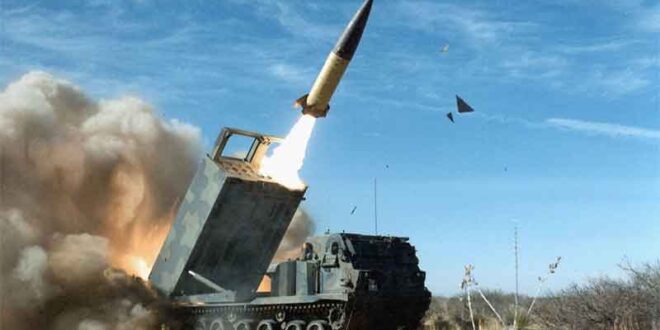The United States and the UK are preparing to announce imminently that they will facilitate Ukraine firing NATO weapons deep into Russian territory, in the greatest escalation of the war with Russia to date.
Within a matter of days after the announcement, long-range missiles produced by the NATO powers, and provided with targeting data from NATO countries, could be raining down on Russian cities, clearly crossing a threshold set by Russian military doctrine for retaliation with nuclear weapons.
Earlier this week, Ukraine launched its largest volley of explosive drones into the Russian mainland to date, resulting in the first fatality in the Russian capital of Moscow and the destruction of dozens of homes.
Commenting on the expected announcements by NATO officials, Russian President Vladimir Putin said, “If this decision is made, it will mean nothing less than the direct participation of NATO countries, the US and European countries, in the conflict in Ukraine.”
He added, “Their direct participation, of course, significantly changes the very essence, the very nature of the conflict.”
Within the Russian political establishment, there are growing demands for Russia to retaliate against the NATO powers, including with nuclear weapons.
On Wednesday, former Kremlin adviser Sergey Karaganov gave an interview to the Kommersant daily in which he urged the country to be prepared to use nuclear weapons in response to NATO attacks. “It’s high time we stated that any massive strikes against our territory give us the right to respond with a nuclear strike,” he said.
The US and its NATO allies are acting with staggering recklessness. The NATO powers have justified their actions by baldly asserting that Putin will not retaliate in kind to US actions.
On Monday, a group of leading House Republicans published a letter to President Joe Biden calling for the lifting of all remaining restrictions on the use of NATO-provided weapons by Ukraine. The letter declared that “concerns about escalation” have been “consistently invalidated since Day One of the war.” It asserted, “Neither Ukraine’s use of US-provided weapons in Russia nor its military incursion into Russia’s Kursk region – the first foreign occupation of Russian territory since World War II – has triggered a Russian escalatory response.”
These arguments do not stand up to the most basic scrutiny. Why would the fact that Russia has not retaliated against lesser provocations in the past mean that it will not respond to greater ones in the future? In fact, the failure to respond in the past could raise the pressure on Putin to escalate in kind.
Biden has called Russian President Vladimir Putin a “murderous madman on the march.” But why would a “madman” president be expected to respond to attacks on his cities with restraint and moderation?
When the Soviet Union stationed nuclear weapons on the island of Cuba during the Cuban Missile Crisis in October 1962, US President John F. Kennedy declared that it “shall be the policy of this nation to regard any nuclear missile launched from Cuba against any nation in the Western Hemisphere as an attack by the Soviet Union on the United States, requiring a full retaliatory response upon the Soviet Union.”
What keeps Putin from repeating Kennedy’s words back to Biden? “It shall be the policy of this nation to regard any missile launched from Ukraine against any nation in the Eastern Hemisphere as an attack by the United States, requiring a full retaliatory response upon the NATO alliance.”
Indeed, there is an element of conscious and deliberate provocation in the actions of the NATO powers.
Russia appears to be on the brink of a significant military breakthrough in the Donbas and is launching a new offensive against Ukrainian troops in Kharkiv. Amid mounting domestic opposition within Ukraine to the war, the entire eastern front is at risk of collapsing without a substantial intervention from NATO.
Just two months ahead of a pivotal US presidential election, the US and NATO powers are seeking to create “facts on the ground” that would force an escalation of the war regardless of the outcome of the election.
The escalating eruption of US militarism is compelled by the deepening and protracted crisis of US global economic hegemony. The price of gold—a proxy for concerns about the future of the dollar—has increased in value against the US dollar by 3 percent in the past month, 15 percent in the past 6 months, 30 percent in the past year, and nearly 70 percent in the past five years.
Meanwhile, the US federal debt continues to balloon, reaching $35.3 trillion. The United States is now paying a staggering $3 billion per day in interest alone on the federal debt.
A substantial devaluation of the dollar would make this massive debt, together with the debts of major US corporations, impossible to repay.
In other words, ensuring global hegemony through whatever means necessary is a desperate and existential question for US imperialism, and Washington will go to any means to secure it.
As Vice President Kamala Harris said during this week’s presidential debate, “sustaining America’s standing in the world” means “ensuring we have the most lethal fighting force in the world.”
The war with Russia is part of a global drive to reorganize the world under US domination; including the Gaza genocide and war with Iran in the Middle East, and preparations for war with China. In pursuit of this monomaniacal drive for global domination, American imperialism is prepared to sacrifice the lives of millions of men, women, and children in every country around the world.
This escalating global war must be stopped! The horrors of the 20th century, including the use of nuclear weapons, must not be repeated!
The war is being accompanied by an intensified assault on the social rights of the working class at home. Workers must resist the drive to make them pay for the war drive and fight to unify the struggle for jobs and wages with the struggle against global imperialist war.
 Eurasia Press & News
Eurasia Press & News




